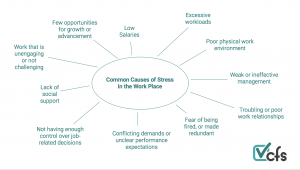Feeling the pressure of work-related stress is not unusual for anyone in the workplace. All jobs can have stressful elements, even if you love what you do. When work-related stress becomes chronic, it can be overwhelming, and ultimately harmful to both physical and emotional health. We’ve put together a few coping mechanisms to help manage your stress in the workplace.

Ways to Manage your Stress at Work
Identify and track your stressors
Through identifying and tracking the situations which create the most stress, you are able to find patterns among your stressors and your reactions to them.
Record your thoughts, feelings and information about the environment which caused you to feel stressed out. Then identify how you reacted to the situation, did your reaction help or worsen the situation?
Develop positive responses to feeling stressed
Find healthy ways which help you relax when feeling stressed, instead of attempting to fight it with bad choices, such as alcohol or unhealthy fast-food. There are great ways to relieve stress, such as exercise, or making time to do your favourite hobby or activity.
Ensure that whatever it is that makes you feel relaxed, whether its reading a book, playing tennis or baking a cake, that you are setting aside time for yourself to do things that make you happy.
Establish boundaries
In today’s world, where it is so easy to connect with others, it isn’t uncommon to feel the pressure to be available 24 hours a day.
However, that pressure is unrealistic and it is important to establish some work-life boundaries for yourself. This could mean making a rule with yourself not to check e-mails when you’re at home, or putting your phone in a different room during dinner.
Everybody is different, and each person has different preferences on how much they want their work and home life to blend. But creating clear and consistent boundaries between these two realms can significantly help reduce potential stressed caused by the work-life conflict.
Don’t sacrifice your sleep
It might feel like you just don’t have enough time to get a full night’s sleep. But sacrificing your sleep interferes with how you perform in the daytime.
Lack of sleep decreases creativity, productivity, problem-solving skills and the ability to focus. These are all crucial skills that you need to perform well. The better rested you are, the more focused you will be, therefore you will be better equipped to tackle your job responsibilities and cope with workplace stresses.
Get the support you need to help reduce stress at work
Accepting help from trusted family and friends can drastically improve your ability to manage stress. Employee health is linked to productivity in the workplace, therefore it is in your boss’ best interest for you to be at your best health, mentally and physically.
This gives your boss the incentive to create a work environment that promotes employee well-being. You can encourage this by opening up a conversation with your boss, whereby together you can develop an effective plan so that you are able to work at your best. However, if you continue to feel overwhelmed, you may want to talk to a mental health professional, who can help you better manage stress and change unhealthy behaviour.
—
Here at Complete Food Safety, we provide practical, tailored Health & Safety advice and consultancy services. From risk assessments to accident support and training presentations, we can help.
References:
HSE, Stress and Mental Health at Work, Accessed January 2022

